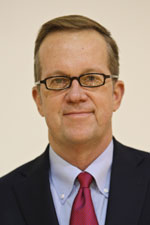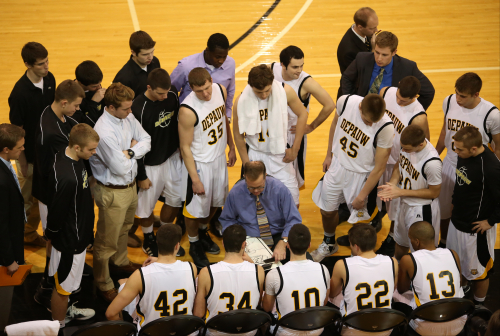Coach Bill Fenlon's Analysis of Late Game Fouls Cited in Wake of UConn-Marquette Game
January 3, 2013

"The real argument after Kevin Ollie's Big East coaching opener is whether UConn had blown the game at the end of regulation by not fouling Junior Cadougan before he hit a three-pointer from 30 feet," writes Jeff Jacobs in a Hartford Courant column on Tuesday night's men's basketball game between the University of Connecticut and Marquette. At the end of a game and leading by three, should the team with the advantage commit an intentional foul, and rule out the possibility of a three-point shot?
Jacobs points to a study by "DePauw coach Bill Fenlon, who wrote a 2,728-word paper on the subject. Fenlon concluded coaches should always foul. He enlisted the help of DePauw mathematics Professor Mark Kannowski, who created a series of decision trees using probability data Fenlon provided on three-pointers, free-throw percentages, rebounding, turnovers and accidental-foul rates. Fenlon concluded there's only a 4.9 percent chance of a team ahead by three losing in overtime if it fouls, yet a 19 percent chance if it doesn't foul. Furthermore, he asserted the odds of hitting a three, getting fouled and winning the game with a free throw is 1 in 750, while hitting one free throw, missing the second, getting the rebound and hitting a three to win is 1 in 1,200."
You'll find the full piece -- "Foul Poll: Coaches, 
Fenlon's paper, 'Up Three: To Foul Or Not To Foul,' also included contributions from Tom Chiarella, visiting professor of creative writing; and Underwood "Woody" Dudley, professor emeritus of mathematics at DePauw. It has previously been cited twice by Sports Illustrated and factored into a 2010 NCAA basketball tournament game coached by Brad Stevens, head men's coach at Butler University and 1999 DePauw graduate, who discussed it during an April 2010 speech at his alma mater.
Back